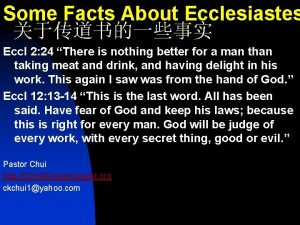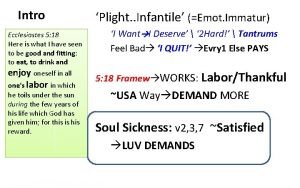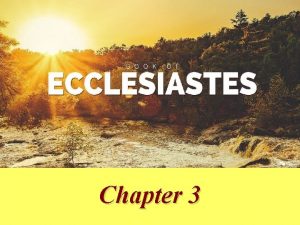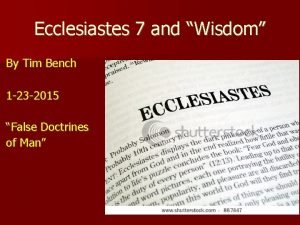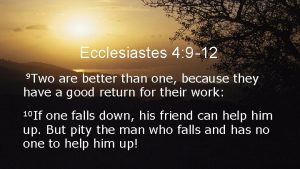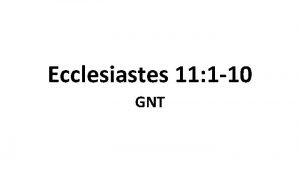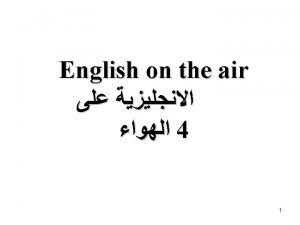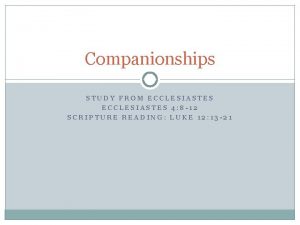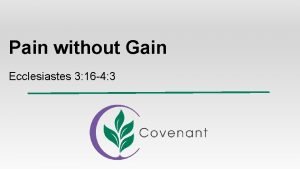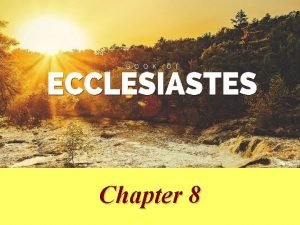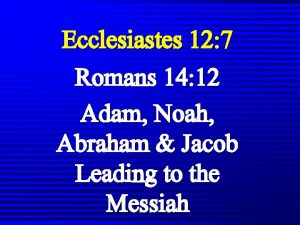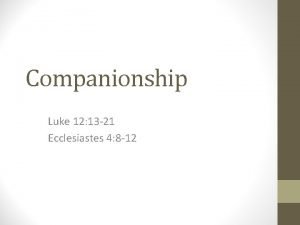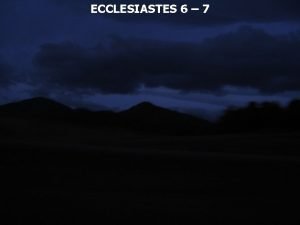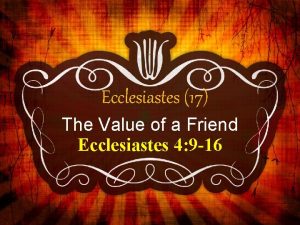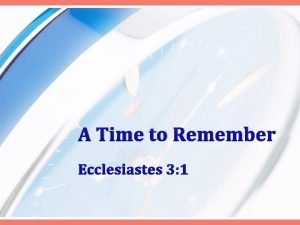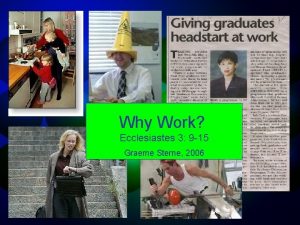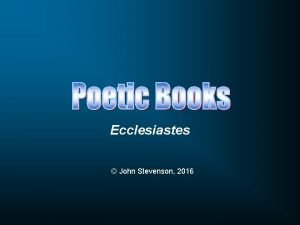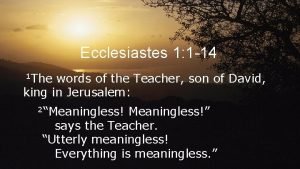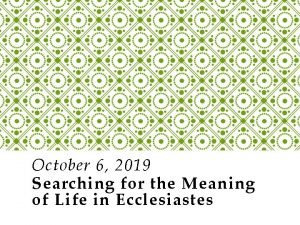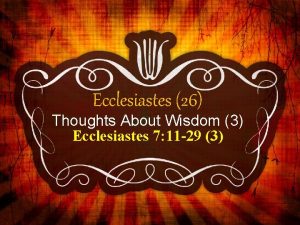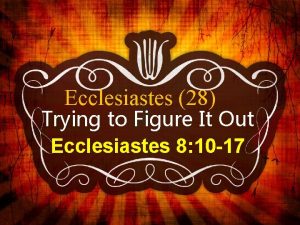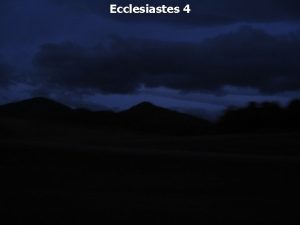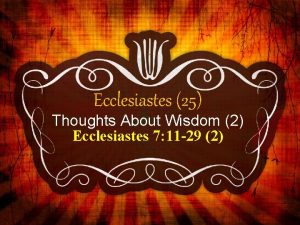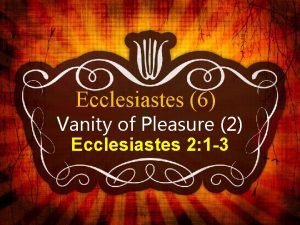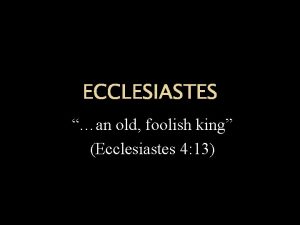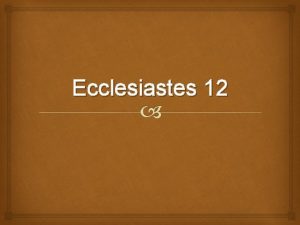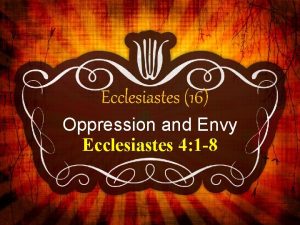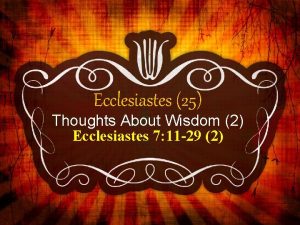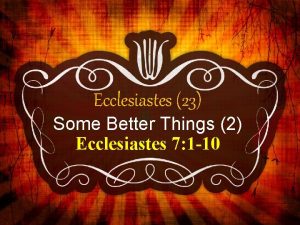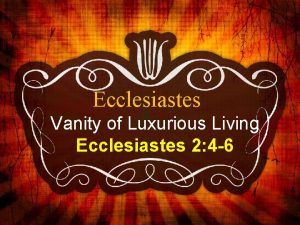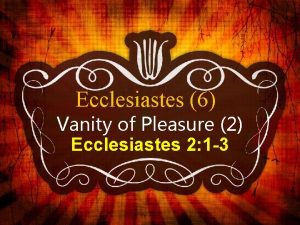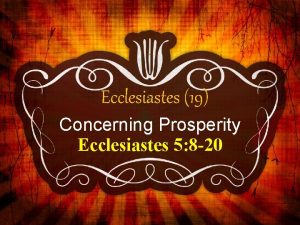Introduction To Ecclesiastes An Introduction of Ecclesiastes n




























- Slides: 28


Introduction To Ecclesiastes

An Introduction of Ecclesiastes n Theme • All efforts and measures to find happiness, meaning and purpose in the difficulty of life apart from God is a waste of time and effort • It provides the reader with the benefit of the wisdom and experience of an older man who has attempted to find meaning in meaningless things and concludes that these things set apart from walking with God are fruitless

An Introduction of Ecclesiastes n n Theme Key word • “Vanity” (Futility or meaninglessness) n n Uniqueness of the book The text’s place in the Bible

The Hebrew Old Testament Arrangement The Law The Prophets The Writings Genesis Exodus Leviticus Numbers Deuteronomy Former prophets Poetical Books Joshua Judges Samuel Kings Psalms Proverbs Job Latter Prophets Isaiah Jeremiah Ezekiel The Twelve Five Rolls (Megilloth) Song Of Songs Ruth Lamentations Esther Ecclesiastes Historical Books Daniel Ezra-Nehemiah Chronicles

An Introduction of Ecclesiastes n n n Theme Key word Uniqueness of the text The text’s place in the Bible Title • • • Hebrew = Qohelet Greek = Ekklesiastes Latin = Ecclesiastes

Qohelet Gatherer of God’s People n Hebrew = Qohelet • “to convoke an assembly, to assemble” n Greek = Ekklesiastes • Derived from the root ekklesia • “one who stands before an assembly; a preacher” n Latin = Ecclesiastes • “speaker before an assembly”

The Preacher n Unity • Reasons for questioning the single authorship of Ecclesiastes: n n The literary form of the book The seeming contradictions of the text

Multiple Writer Theories n Three writers • Qohelet • An orthodox “editor” (probably a member of the Hasidim) • Another “sage” (hakam “wise man”) who inserts the more traditional proverbs

Multiple Writer Theories n n Three writers Two writers • Qohelet • A narrator n n Prologue (1: 1 -1: 11) Epilogue (12: 8 -12: 14)

Multiple Writer Theories n n n Three writers Two writers Single writer

The Preacher n n Unity Authorship

Identification of Qohelet n n A title rather than a proper name Facts about the word: • • Derived from the verb qahal Often used as a noun (one who assembles) Active participle Gender = feminine n n The sons of Solomon's servants: the sons of Sotai, the sons of Sophereth, the sons of Peruda (Ezra 2: 55; Neh. 7: 57) Cophereth (OT: 5618) (so-feh'-reth); feminine active participle of OT: 5608; a scribe (properly, female); Sophereth, a temple servant

Solomon as an “Assembler” n Solomon is connected with the verb root “qhl” in 1 Kings 8 • • Now Solomon assembled the elders of Israel and all the heads of the tribes, the chief fathers of the children of Israel, to King Solomon in Jerusalem, …Therefore all the men of Israel assembled with King Solomon…(1 Kings 8: 1 -2) Then the king turned around and blessed the whole assembly of Israel, while all the assembly of Israel was standing. 1 Kings 8: 14 Then Solomon stood before the altar of the LORD in the presence of all the assembly of Israel, and spread out his hands toward heaven; 1 Kings 8: 22 Then he stood and blessed all the assembly of Israel with a loud voice, saying: 1 Kings 8: 55

The Great Debate n n Who is Qohelet? When did he write the book of Ecclesiastes?

Arguments Against a Solomonic Authorship n n n The date of the book based on linguistics Solomon’s apostate condition The enigmatic statements in regard to governmental injustice

Arguments For Solomonic Authorship n n Title of the writer (1: 1, 12) Self description: • Wealth, power & prestige (2: 9; 1 Kings 10: 14 -29) • Wisdom (1: 16; 2: 9; 1 Kings 3: 9) n Solomon as an “assembler” of God’s people (1 Kings 8)

The Expositors Bible Commentary “The tradition of David as singer and psalmist is borne out by an early reference at Amos 6: 5 and is taken seriously in the light of the lament for Saul and Jonathan (2 Sam. 1: 1727). We ought to take Solomon’s reputation for wisdom equally seriously and see his court as the center that drew wise men from all quarters to discuss problems of living in a difficult world (1 Kings 4: 34). ”

The Preacher n n n Unity Authorship Date

Two Theories on the Date Early Late (1000 BC =/-) (3 rd-4 th Century BC)

Linguistic Indications of a Late Date n Persian influence • I made myself gardens (uwpardeecyim) and orchards, and I planted all kinds of fruit trees in them. (Eccl 2: 5) • Because the sentence (pitgam) against an evil work is not executed speedily, therefore the heart of the sons of men is fully set in them to do evil. (Eccl 8: 11)

Linguistic Indications of a Late Date n n Persian influence Aramaic influence • 42 “aramaisms” in the text • Not yet understood in the days of Hezekiah [716 -687] (2 Kings 18: 26) • Other Aramaic texts in the Old Testament (Jer. 10: 11; Dan. 2: 47: 28; Ezra 4: 8 -6: 18; 7: 12 -26; Gen. 31: 47 [? ])

Linguistic Indications of a Late Date n n n Persian influence Aramaic influence Classic Hebrew vs. post-exilic Hebrew • Linguistic updating

The Preacher n n n Unity Authorship Date Origin & Destination Literary form Theological considerations

The Great Experiment! n n And I set my heart to seek and search out by wisdom concerning all that is done under heaven; this burdensome task God has given to the sons of man, by which they may be exercised. (Eccl 1: 13) And I set my heart to know wisdom and to know madness and folly. I perceived that this also is grasping for the wind. (Eccl 1: 17)

The Great Experiment! I said in my heart, "Come now, I will test you with mirth; therefore enjoy pleasure"; but surely, this also was vanity. I said of laughter -- "Madness!"; and of mirth, "What does it accomplish? " I searched in my heart how to gratify my flesh with wine, while guiding my heart with wisdom, and how to lay hold on folly, till I might see what was good for the sons of men to do under heaven all the days of their lives. I made my works great, I built myself houses, and planted myself vineyards. (Eccl 2: 1 -4)

The Great Experiment! Whatever my eyes desired I did not keep from them. I did not withhold my heart from any pleasure, For my heart rejoiced in all my labor; And this was my reward from all my labor. Then I looked on all the works that my hands had done And on the labor in which I had toiled; And indeed all was vanity and grasping for the wind. There was no profit under the sun. (Eccl 2: 10 -11)

Ayn Rand “My philosophy, in essence, is the concept of man as a heroic being, with his own happiness as the moral purpose of his life, with productive achievement as his noblest activity, and reason as his only absolute. ”
 Ecclesiastes 7:3-4
Ecclesiastes 7:3-4 Ecclesiastes meaning of life
Ecclesiastes meaning of life Facts about ecclesiastes
Facts about ecclesiastes Umusonga in english
Umusonga in english Ecclesiastes 5:18
Ecclesiastes 5:18 Ecclesiastes outline
Ecclesiastes outline Ecclesiastes 9:8-10
Ecclesiastes 9:8-10 Ecclesiastes 7:26-28
Ecclesiastes 7:26-28 Ecclesiastes 4 9-12
Ecclesiastes 4 9-12 Ecclesiastes 11 gnt
Ecclesiastes 11 gnt Ecclesiastes 9:8-10
Ecclesiastes 9:8-10 Ecclesiastes 4 9 12 nkjv
Ecclesiastes 4 9 12 nkjv Ecclesiastes 4 9-11
Ecclesiastes 4 9-11 Ecclesiastes 12 1
Ecclesiastes 12 1 Ecclesiastes 3:16-17
Ecclesiastes 3:16-17 The days of your youth
The days of your youth Outline of ecclesiastes
Outline of ecclesiastes Ecclesiastes 14:12
Ecclesiastes 14:12 Ecclesiastes 1 meaning of life
Ecclesiastes 1 meaning of life Ecclesiastes
Ecclesiastes Ecclesiastes 6 1
Ecclesiastes 6 1 The value of a friend ecclesiastes
The value of a friend ecclesiastes Ecclesiastes 12:1-3
Ecclesiastes 12:1-3 Ecclesiastes 3:9-15
Ecclesiastes 3:9-15 Ecclesiastes 2:18
Ecclesiastes 2:18 Ecclesiastes 1:1-14
Ecclesiastes 1:1-14 Wisdom from below
Wisdom from below Ecclesiastes 3
Ecclesiastes 3 Ecclesiastes 9 11
Ecclesiastes 9 11


